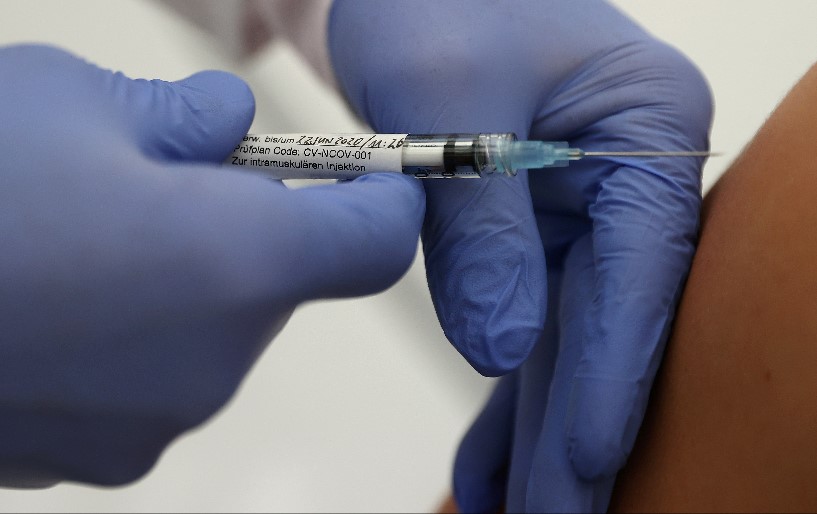KUALA LUMPUR, Sept 23 — COVAX coordinators have released the financial payment mechanisms for member countries that buy Covid-19 vaccines through the global plan from their national budgets, requiring upfront payments by October 9.
According to CodeBlue’s calculations based on participation arrangements by the COVAX Facility — a global coronavirus vaccine access plan co-led by the World Health Organization (WHO) that aims to provide two billion doses by the end of 2021 — Malaysia would be required to pay upfront at least US$20.48 million (RM84.7 million) to secure 12.8 million doses to vaccinate 20 per cent, or 6.4 million people, of its 32 million-strong population on a two-dose regimen.
The down payment of US$20.48 million is in addition to a US$114.56 million (RM473.76 million) financial guarantee, totalling US$135.04 million (RM558.46 million), that must be made by October 9. This is based on a down payment of US$1.60 (RM6.62) and financial guarantee of US$8.95 (RM37), totalling US$10.55 (RM43.63) per dose.
In contrast, China’s state-owned pharmaceutical company Sinopharm has priced its experimental Covid-19 vaccine at US$145 (RM600.17) for two doses, or US$72.50 (RM300) per dose, nearly seven times more expensive than COVAX’s all-inclusive price of US$10.55 (RM43.63) per dose. Purchasing Sinopharm’s coronavirus vaccine would mean spending US$928 million (RM3.8 billion) for 12.8 million doses to vaccinate 20 per cent of Malaysia’s population on a two-dose regimen, compared to about RM559 million through COVAX.
The Ministry of Science, Technology and Innovation announced last Saturday that besides joining COVAX, the Malaysian government was also making agreements with China, while the Ministry of Health (MOH) has signed non-disclosure agreements with several international pharmaceutical companies that are testing Covid-19 candidate vaccines in Phase 3 clinical trials.
According to a COVAX Facility explainer document, self-financing participant countries can join either the “Committed Purchase” arrangement or the “Optional Purchase” arrangement.
Participating countries buying the Covid-19 vaccines from their national budgets are required to make upfront payments and financial or risk-sharing guarantees under either arrangement by this coming October 9 to reserve vaccine doses.
This means that if Malaysia is joining COVAX as a self-financing participant, the Malaysian government will likely have to come up with the money from the federal Budget 2020, as Budget 2021 will only be tabled in Parliament on November 6. (As of September 21, Malaysia still has not yet signed a legally binding commitment agreement or submitted a non-binding confirmation of intent to participate in COVAX).
The government has allocated MOH a special budget of RM1.005 billion to curb Covid-19 transmissions in the country. Health Minister Dr Adham Baba told the Dewan Rakyat last July that MOH has spent RM650 million from the allocation on items like test kits, protective gear, and Covid-19 allowance payments for health care workers.
Upon joining the COVAX Facility, self-financing participant countries will be asked to inform COVAX the share of their population (between 10 and 50 per cent) that they want to cover through the Covid-19 vaccine doses provided by the Facility.
“The Facility is also committed to meeting a participants’ preferred choice of vaccine and will endeavour to do so despite uncertainty about which vaccines will be available, when, and at what scale,” said COVAX.
COVAX said its Facility would negotiate advance purchase agreements with vaccine manufacturers on behalf of participants to secure access to vaccine doses in specified volumes, delivery timetables and prices.
“The Facility will endeavour to negotiate the best possible pricing from manufacturers that is lower than or at least no higher than pricing manufacturers have agreed in bilateral deals.”
COVAX
“The cost per dose will vary by vaccine and manufacturer and the Facility will pass through the actual, negotiated price to participants,” said COVAX.
COVAX also said US$6.2 billion in total investments is required to get the Facility started, equivalent to US$3.10 per dose, or US$6.20 per person, with any unused funding returned to participants. The US$6.2 billion includes US$5.7 billion of investments to accelerate manufacturing scale-up to secure two billion doses, by the end of 2021, to vaccinate one billion people (assuming a two-dose regimen). The remaining US$500 million is needed for financing, insurance, and Facility operating or management costs (the latter is estimated to be US$50 million or about 0.2 per cent of total expected Facility costs).
Committed Purchase Arrangement
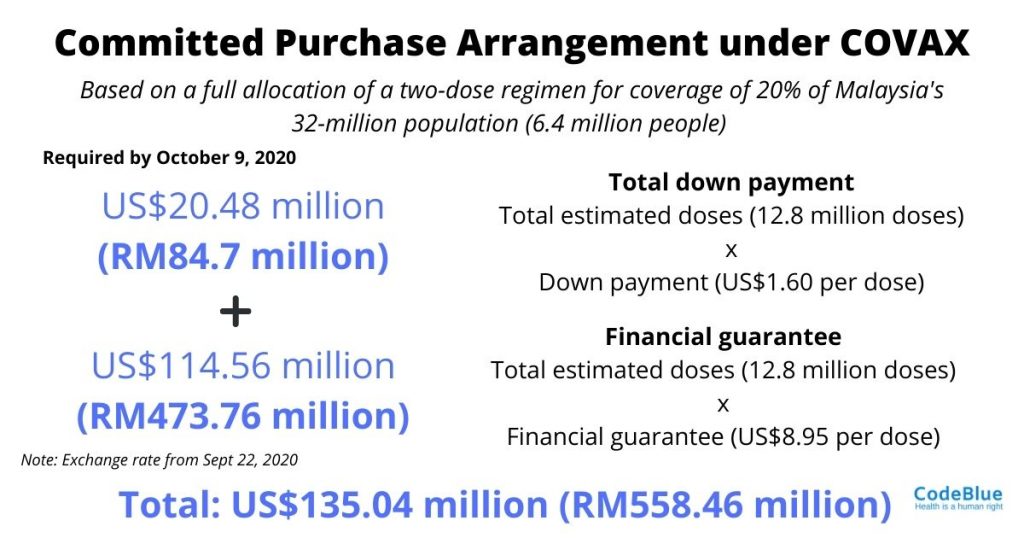
The Committed Purchase arrangement commits participants to purchasing allocations of approved vaccines from the COVAX Facility. Participating countries will make a lower upfront payment than the US$3.10 per dose cost because they also provide a financial guarantee.
In the Committed Purchase arrangement, participants make a lower upfront payment of US$1.60 (RM6.62) per dose, or US$3.20 (RM13.23) per person, and provide a financial guarantee of US$8.95 (RM37) per dose or US$17.90 (RM74) per person. COVAX assumes a two-dose vaccine regimen.
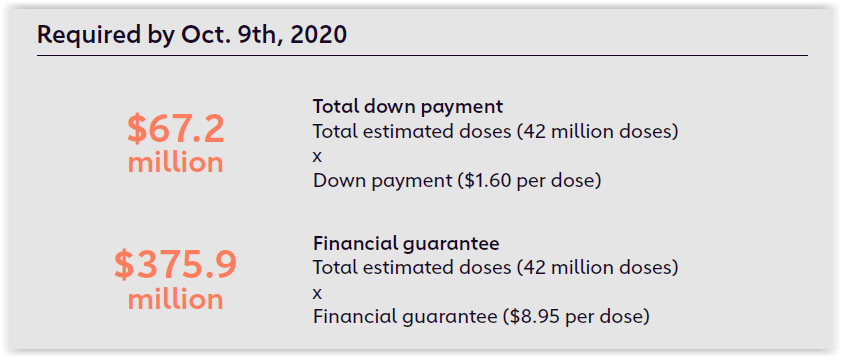
An example provided by the COVAX Facility explainer for a country with a chosen 30 per cent coverage of a 70-million population for a two-dose vaccine regimen estimates a financial commitment of US$443.1 million (RM1.8 billion) required by October 9, 2020, comprising the US$67.2 million total down payment and US$375.9 million financial guarantee.
If Malaysia were to participate in the “Committed Purchase” arrangement with 20 per cent coverage of its 32-million population for a two-dose vaccine regimen, amounting to 12.8 million doses, this would cost about US$20.48 million (RM84.70 million) for the total down payment and US$114.56 million (RM473.76 million) financial guarantee, totalling US$135.04 million (RM558.46 million). This is based on a down payment of US$1.60 (RM6.62) and financial guarantee of US$8.95 (RM37) per dose.
Participants will procure the full number of doses of the allocated vaccine at the actual price agreed with the manufacturer. If the actual price is lower than the estimated all-inclusive cost that is the basis for the participants’ financial guarantee, participants will pay less than the financial guarantee and may choose to have that guarantee returned or use it to procure additional volumes (if available).
If the actual price is higher than the estimated all-inclusive price, participants are only committed to pay the total commitment amount set out in the Commitment Agreement (even if this covers less than the indicated coverage of the population), but will have the option to procure doses up to the desired quantity for an additional cost.
A Committed Purchase participant may opt out of candidate vaccines only based on price. If a participant indicates in its Commitment Agreement that it is not interested in buying vaccines with prices double the all-inclusive price per dose of US$10.55 (RM43.63), COVAX will not reserve doses for a participant for any vaccine costing more than $21.10 per dose.
“This could cause a participant to experience delays in receiving vaccines if more expensive vaccines are approved first,” said COVAX.
Optional Purchase Arrangement
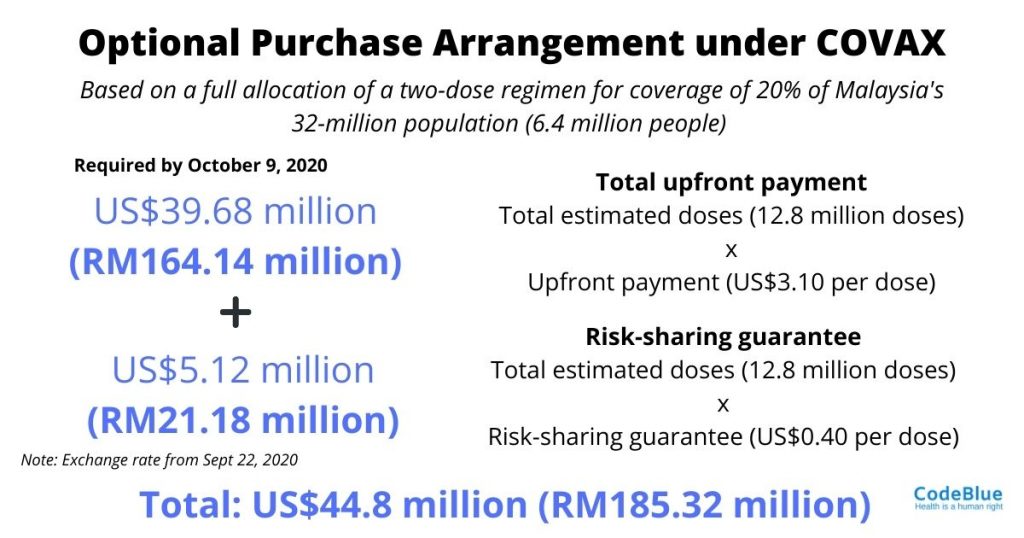
As for the Optional Purchase arrangement, participants can decide whether to buy any approved vaccine allocated to them, while retaining the ability to receive its full share of doses of other approved vaccines, subject to supply becoming available.
“Deciding not to purchase a particular candidate may delay the time until a participant receives doses, particularly in the initial phase where there may only be one or two approved vaccines available and the quantities could be limited,” said COVAX.
Under the Optional Purchase arrangement, participants will pay the full upfront payment of US$3.10 (RM12.82) per dose, equivalent to US$6.20 (RM25.65) per person for a two-dose vaccine regimen, to reserve options to purchase vaccine doses through the COVAX Facility.
“Participants will be able to decide which vaccines it will purchase, for example taking into consideration national vaccine strategies. If a participant decides not to purchase a specific vaccine, it is possible that it could lead to a delay in receiving doses from the Facility until volumes of different approved vaccines are secured,” said COVAX.
Participants can decide on purchasing a certain candidate vaccine either before the COVAX Facility enters into an agreement with a manufacturer, or at the point at which COVAX confirms orders with manufacturers.
Under the first decision window, participants can indicate their interest in buying a vaccine from a particular manufacturer before the COVAX Facility signs a deal with that manufacturer. If a participant decides that it is interested, it will be issued an option to purchase doses from that deal in the second decision window. But, if a participant decides that it is not interested, it will not be issued an option to purchase doses from that deal.
Under the second decision window, at the point of the COVAX Facility confirming orders with manufacturers later in the clinical development process of the candidate vaccine, participants will receive doses that have been “pre-paid” out of its upfront payment and can purchase the remainder of its allocation at the price per dose agreed between the Facility and the manufacturer in its supply agreement.
If a participant is not interested in exercising its option, it can trade its allocation on the proposed COVAX Exchange or donate, at its discretion, its allocation to other participants or to the COVAX Advance Market Commitment (AMC). The COVAX Exchange — co-created with both self-financing participants and eligible economies of the AMC — aims to facilitate trading of allocations of vaccine for all participants to allow each participant to optimise for their individual needs. The COVAX AMC is a financial instrument that supports the procurement of the vaccines for 92 low- and middle-income economies.
“If the participant ultimately decides not to exercise its option, it will not be committed to purchase its allocation. However, the Facility will also not refund its share of the upfront payment invested in this candidate.”
COVAX
Participants that choose the Optional Purchase arrangement will also have to provide a risk-sharing guarantee of US$0.40 (RM1.65) per dose to help protect the COVAX Facility against any liabilities resulting from participants deciding not to purchase a particular vaccine candidate, after the Facility has already entered into a contract with the manufacturer.
“If a participant fails to provide the risk-sharing guarantee before October 9th, it will only be able to decide whether to purchase a vaccine during the first decision window, i.e., before deal signature, and not the second decision window,” said COVAX.
“The Facility would only draw upon this risk-sharing guarantee in the scenario that the Facility does not absorb the liability resulting from participants waiving options for doses the Facility has committed to purchase from manufacturers. The guarantee will be released back to the participant should the Facility not incur such liabilities.”
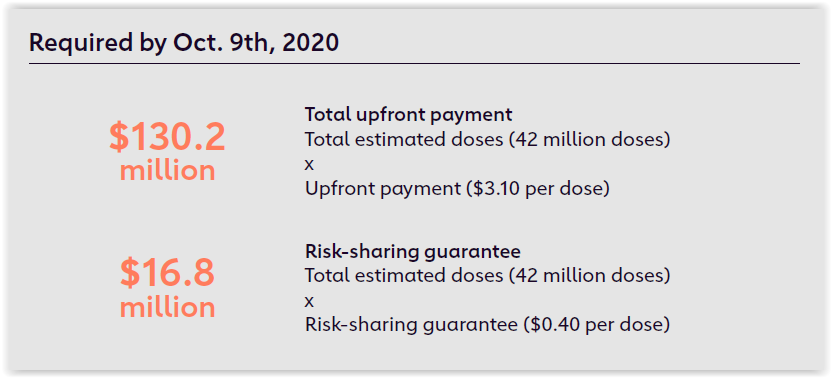
An example provided by the COVAX Facility explainer for a country with a chosen 30 per cent coverage of a 70-million population for a two-dose vaccine regimen estimates a financial commitment of US$147 million required by October 9, 2020, comprising the US$130.2 million total upfront payment and US$16.8 million risk-sharing guarantee.
If Malaysia were to participate in the Optional Purchase arrangement with 20 per cent coverage of its 32-million population for a two-dose vaccine regimen, amounting to 12.8 million doses, this would cost about US$39.68 million (RM164.14 million) for the total upfront payment and US$5.12 million (RM21.18 million) risk-sharing guarantee, totalling US$44.8 million (RM185.32 million). This is based on an upfront payment of US$3.10 (RM12.82) and risk-sharing guarantee of US$0.40 (RM1.65) per dose.
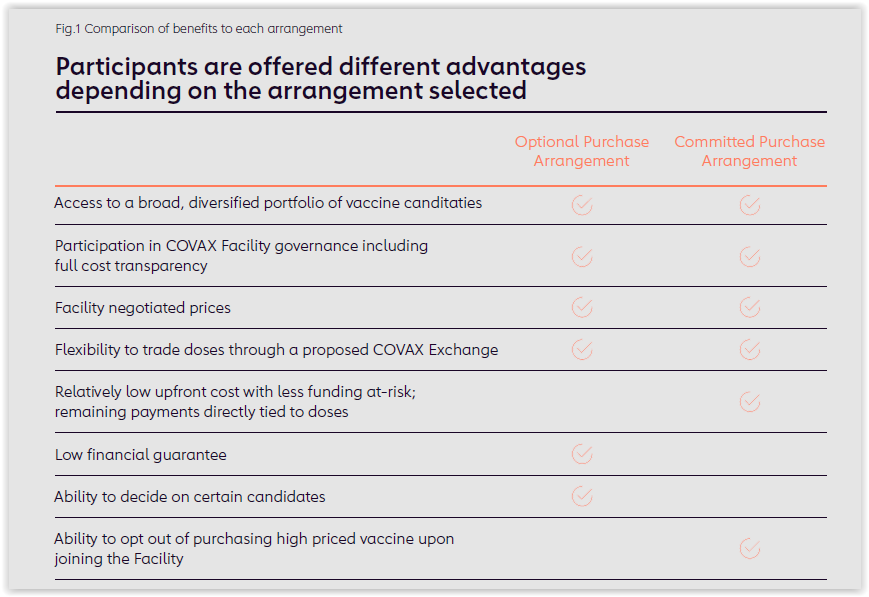
A comparison of advantages between the Optional Purchase and Committed Purchase arrangements, according to COVAX, shows relatively low upfront cost, with less funding at risk and remaining payments directly tied to doses, under the Committed Purchase arrangement.
However, the Optional Purchase arrangement has the advantages of low financial guarantee and the ability to decide on certain candidate vaccines.
“While the upfront payment for the Optional Purchase is larger than for the Committed Purchase, the all-inclusive costs are expected to be the same for both arrangements.
“The governance and decision-making rights of self-financing participants are the same under both arrangements,” said COVAX.


